Deus Ex: Human Revolution Review
 Every now and then a game comes along that is so amazingly realised time seems to stand still when you’re playing it. These games immerse you entirely in their world – you feel like you know the characters – you feel like you’re a part of the universe – you’re so completely and utterly entranced by the world they have created that you forget about everything around you. This happened for me with Mass Effect. It happened with The Witcher and Vampire The Masquerade: Bloodlines. And now it’s happened with Deus Ex: Human Revolution.
Every now and then a game comes along that is so amazingly realised time seems to stand still when you’re playing it. These games immerse you entirely in their world – you feel like you know the characters – you feel like you’re a part of the universe – you’re so completely and utterly entranced by the world they have created that you forget about everything around you. This happened for me with Mass Effect. It happened with The Witcher and Vampire The Masquerade: Bloodlines. And now it’s happened with Deus Ex: Human Revolution.
The premise is simple. The core plotline one we’ve seen before. You play as Adam Jensen, the security chief for one of the game’s big corporations. After the events at the beginning of the game, you begin a search for answers. I won’t go into the plot or spoil the story, but suffice to say the writing here is top notch. The storyline keeps you involved and engaged, and paired with some absolutely fantastic voice over work, you will be taken into the gameworld. And the gameworld is absolutely incredible. But more about that later. Let’s cover the basics first.
The in-game tutorials are very well done. They provide you with the basics you need in a simplistic, video style at spaced intervals so you aren’t overwhelmed by information overload. They’re well integrated into the gameplay as well – only popping up when the action/button/game mechanic they deal with first appears. And watching them is entirely optional.
The cover system the game employs takes a little getting used to and can at times be finicky, but once you get a handle on it, it’s extremely intuitive and well done. You never feel as though you’re searching for cover – there are points in the game where it’s a challenge to stay in cover – but these areas are more of a case of providing a challenge for the player rather than bad level design. The fact that you can pick up boxes and other items and use them as cover while you move around is a nice addition.
Cutscene-to-action transitions are also exceptionally well done. They aren’t jarring and they keep you firmly within the narrative. It’s deceptively simple the way they are implemented, but it works nonetheless. You never feel like you’ve just been pushed out of a cutscene to face the action. Everything transitions smoothly and I have to give Eidos Montreal credit for that.
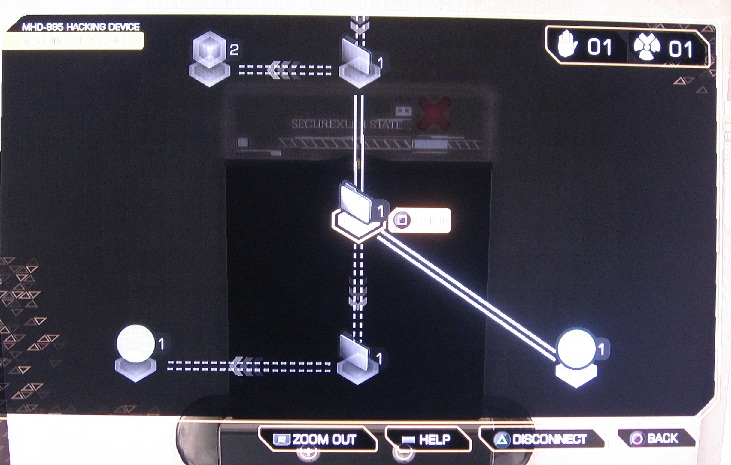
Another thing I must mention is the hacking mini-game. When a game requires you to engage in a mini-game in order to further the plotline – and there are sections in Deus Ex: Human Revolution where you have to hack either a door or a computer – that minigame needs to be well-done. It can’t frustrate the player, or cause the player to want to give up because of its incredible difficulty or time limits imposed (I’m looking at you, Alpha Protocol). In Deus Ex: Human Revolution – the hacking minigame is fantastic. Enjoyable, even. And this is a huge advantage for a game which rewards you for hacking. The mini-game itself is easy to get a handle on, and it doesn’t punish you if you fail. You’re simply locked out of the system for a preset amount of time before you are able to try again. It’s challenging, and it provides a real sense of achievement when you do beat the system once it’s discovered your presence. There’s enough variety in the mini-game that you’re always kept on your toes, and the fact that you can attempt a more difficult route to hack if you want to receive extra rewards like additional credits means you can really challenge yourself. There aren’t too many mini-games I would enjoy attempting, but Deus Ex: Human Revolutions’ hacking mini-game is one of them.
Exploration of the world around you is one of the main drawcards of Deus Ex: Human Revolution – and with the way Eidos Montreal have crafted the world – you will want to do so. Not just because of the sense of atmosphere that is inherent within all the hub worlds and with everywhere you visit – but also because the game itself rewards you for exploring. Finding a hidden passsage or an alternate route will net you XP, and XP is very important as it earns you Praxis points. Praxis points are, in effect, the skill points of the game, providing you with the ability to upgrade your existing augmentations, or to install new ones. And you’ll really want to get on the augmentation bandwagon. There are so many fantastic augmentations on offer that you’ll wish you could grab them all – but the game will force you into specialising if you want to get the best out of the ones you choose. Whilst I found it a touch frustrating to not be able to upgrade all the augmentations I wanted, I never-the-less appreciated Eidos’ attempt to ground the game in some semblance of reality and to not make their main character Mr Untouchable I can-do-everything. It also motivates you to replay the game using a different tactic and focusing on a different skillset – and I already know exactly what augmentations I’ll be grabbing on my next ‘guns-blazing, balls to the wall’ playthrough.
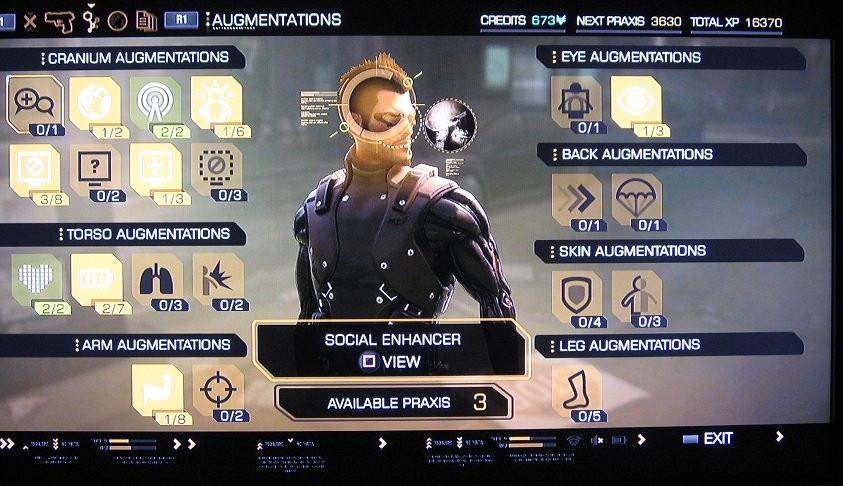
Getting back to the gameworld of Deus Ex: Human Revolution – I’ve touched on it briefly above – but I cannot stress how much of an atmosphere Eidos have instilled in this game. Walking through the various areas of the game provides you with such a sense of foreboding ‘there-ness’ (excuse the use of a made up word, but the feeling you get when you’re playing this game is hard to put into words) that the game stays with you long after you’ve stopped playing. Everything has been crafted with such attention to detail, and dare I say it love, that the world actually exists when you play it. You don’t just feel like you’re a visitor – you feel like you’re there.
The world is alive. Anyone you can see, you can interact with, and they will talk to you. They’ll tell you about recent events, or bitch about what’s going on, or tell you what they think of you. They’ll even ask your opinion on things. And perhaps even more impressively – when you aren’t talking to them – they’re doing their own thing. Talking to eachother. Playing a portable video game. Receiving a call. Heck – even lighting up a cigarette. And sometimes, if they’re talking about you – you can confront them on what they’re saying and set them straight. It makes you feel like you are a part of the world – and it’s a very hard feeling for a video game to create. But Eidos Montreal does it here, and they do it well.
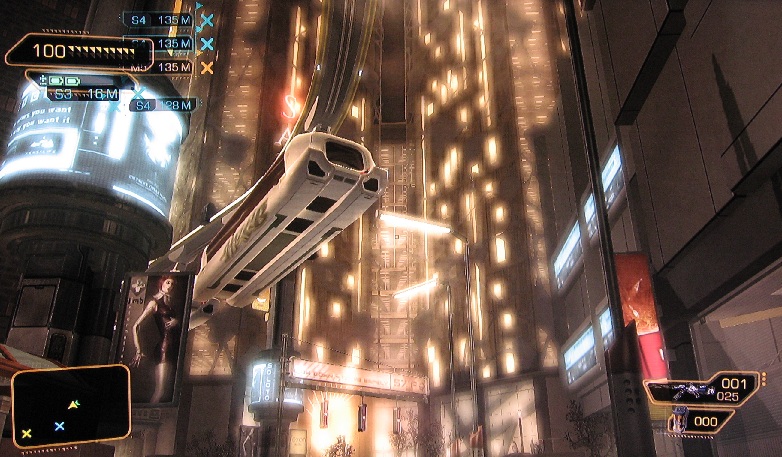
The world also feels lived in, and here it’s the finer details that really come to the fore. eBooks you can pick up and read that aren’t mandatory to the game’s storyline but that do provide extra details into the world (I found a romance ebook on the desk of one of my colleagues’ offices and boy I wish I could have read the whole thing) are scattered about the environment, as are newspapers that have a really fantastic, sci-fi feel. Neon billboards advertising various in-game products combine with grafitti-adorned mono-rail carriages to give the world a sense of urban decay that feels just perfect for a futuristic recreation of Detroit. And the conflict between the various factions within the game provides a wonderful undercurrent of foreboding intensity that you can feel as you’re walking through areas. The gameworld itself is so rich in political machinations and grey moral decisions that playing as Jensen is truly an experience to be savored.
Characters you meet throughout the game are also very well realised, with strengths and flaws, each with their own inherent personalities and motivations. Fantastic VO work combines with some well written lines to create characters that will make an impact on you. Some you’ll love, some you’ll hate, but all of them have one thing in common – they make you feel something for them. And again, this is something that’s very difficult to do in a video game. I’m happy to report that none of the characters fell into stereotypic caricatures for me – I disliked some of them, took opportunities to flirt with others, and couldn’t wait to wipe the smug grin off one in particular. The animation on their models is sometimes hit and miss – but that’s a very small gripe – and it’s never enough to take you out of what’s going on in front of you.
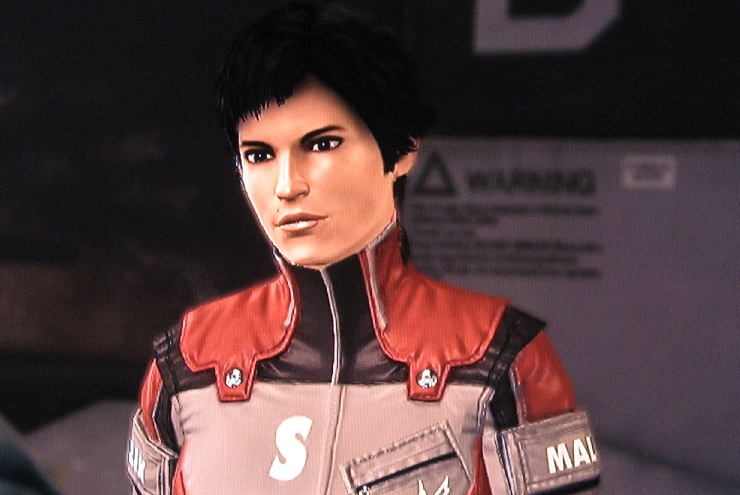
The dialogue system is also very well done, allowing you to play Jensen as whatever character you wish. Want to play the empathetic, all around good guy? You can do it. Alternatively, want to play Jensen as a no-nonsense, brusque, dismissive jerkoff? You can do that too. Eidos Montreal has further expanded their conversation system, incorporating a dynamic element into it, so that the choices you make in your interactions with people will shape the way they respond to you, as well as the quality of the information you receive from them. Aggravate a character by the way you speak to them and they just might retalliate by doing something unexpected. It’s a great way to add both variety and depth to the game, and it further emphasises Eidos’s ‘actions and choices matter’ approach. It’s definitely one of the better conversation systems I’ve come across, and it made speaking to characters very enjoyable.
The soundtrack is also of a high quality, perfectly matching the tone of the world, as well as complimenting the in-game action. It’s a very haunting score to listen to, and one that, in my opnion, enhances the gameplay. It never drowns out the action on screen, never becomes too invasive. It’s the perfect accompaniment to the game, and I have to applaud those who worked on the score.
Side missions are also well done, and provide enough variety that they never become too bothersome or feel like a chore to complete. There’s so many different ways to complete the objectives given to you that missions always feel fresh and new, and you receive a sense of achievement when you find an alternate way of completing a set task. Characters will also remark on the way you go about completing missions – some being impressed with the way you handle yourself. It’s a nice way to pat you on the back, but it never feels patronizing.
But the one thing, above all others, that makes Deus Ex: Human Revolution one of the best games I have played this year is the fact that your actions have consequences. Saying that ‘choices matter’ has almost become a catch-cry for developers these days, but in Deus Ex: Human Revolutions, it rings true. What you do (or do not do) in the world will have an impact on the people around you. Right from the very beginning of the game, you learn that if someone tells you it’s important you do something quickly – you better believe they mean it. When I first heard this in game, I naively thought it was just a bit of lip service – something to make me think that whatever that person was wanting me to do was important, and to provide a little urgency to tasks in the game. After ignoring their frequent attempts to get me to meet with them (and taking my sweet time pilfering cans of beer from the office cafeteria) I eventually met with them and found out my dawdling had had major consequences. Cue immediate restart which saw me making a beeline to that person (with much better consequences). Eidos Montreal has really delivered on the ‘actions have consequences’ mantra and Deus Ex: Human Revolution benefits from this.
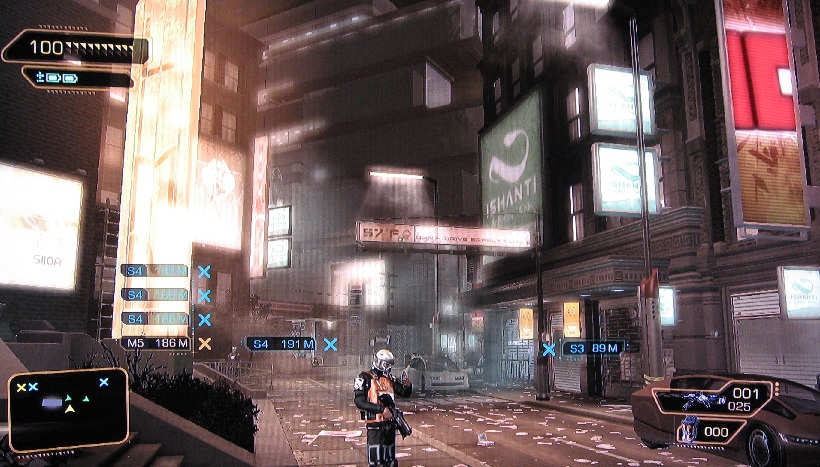
Player choice has been further incorporated into the game by allowing the various goals and objectives that Jensen is given to be completed in a variety of ways. If you’re ever stuck in an area and are finding it difficult to push forward, you simply need to look around and you’ll see a variety of ways to attempt the objective. Want to sneak past guards without engaging them? You can do that. Prefer to go balls to the wall, all guns blazing? You can do that too. Want to try a bit of both? That’s achievable as well – and I think that’s one of the things I really like about the game. If you’re like me and decide to play a stealthy character, but you accidentally get spotted by a guard – you can recover from this. The game provides you with enough weapons and gadgets that you can quickly turn from stealth character to action character and back again.
Speaking of weapons and gadgets – there are a lot on offer in Deus Ex: Human Revolution, but a capped inventory system means you won’t be able to indulge your kleptomaniac tendencies. You’ll have to choose what you want to keep and what you want to take with you into missions, and although this seems limiting, it isn’t. Ammo is scarce in the world – you’ll often only be picking up a bullet or two as you explore the world – so carrying around a bunch of weapons actually handicaps you. It’s much better to specialise – to carry around one, maybe two weapons and then upgrade them with mods. Sell all the ammo you find for other weapons and re-invest your credits into better upgrades for your favoured weapons, or Praxis kits for more Praxis points. I found I was able to progress through the storyline using only three main weapons – upgrading them when I could to keep on par with enemies as I gained XP and Praxis points.
By now I’m sure you know just how much in love with this game I am, and why it is a must buy in my opinion. Deus Ex: Human Revolution is a game which fully immerses you into its world and provides not only an enjoyable world to play in, but one that you’ll remember long after turning off your console/PC of choice. I’d recommend it in a heartbeat to RPG fans, and anyone who likes playing in a world that’s so beautifully realised. Aside from a few niggles and gripes, my time with Deus Ex: Human Revolution has been beyond rewarding, and I’m itching to revisit it for a different playthrough style. You know you’ve found a game you like when it’s difficult to draw yourself away from playing it to write the review.
Do yourself a favour and pick up Deus Ex: Human Revolution. It’s a Save Game Must Buy.
Deus Ex: Human Revolution is out now for PS3, Xbox 360 and PC. PC system specs for those of you wanting to know if the game will run on your PC
Minimum PC Specs:
- OS: Windows XP, Windows Vista or Windows 7 with DirectX 9.0c
- PROCESSOR: 2 GHz dual core
- RAM: 1 GB RAM (Windows XP) / 2 GB (Windows Vista and Windows 7)
- GRAPHICS: NVIDIA GeForce 8000 series or ATI Radeon HD 2000 series or better
- REQUIRED DISC SPACE: 8.5 GB
Recommended PC Specs:
- OS: Windows 7
- PROCESSOR: AMD Phenom II X4 or Intel Core 2 Quad or better
- RAM: 2 GB
- GRAPHICS: AMD Radeon HD 5850
- REQUIRED DISC SPACE: 8.5 GB



